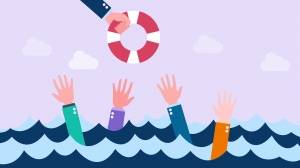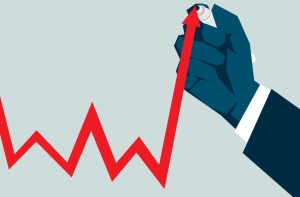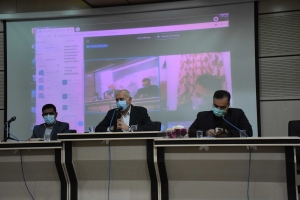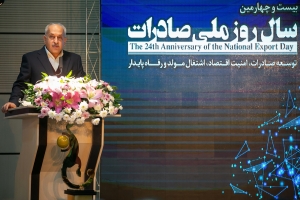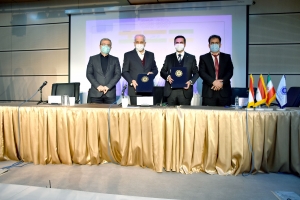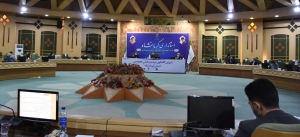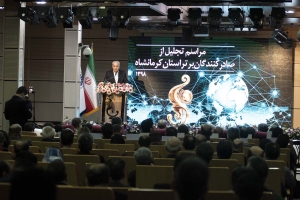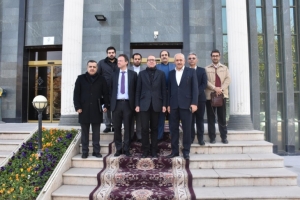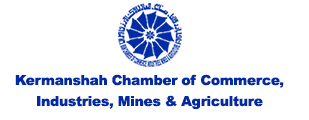
kermanshah
The only way out of the crisis
The crisis, which gripped the world economy in 2008, is by no means comparable to the current era, both in terms of severity and impact and no event had changed or damaged the world’s economy as much as the Coronavirus did since the World War II according to economists. The crisis caused by the Coronavirus pandemic plunged the global trade into a deep recession disrupting the supply chain and there are just signs of improved trade in parts of the world more than a year later; the signs that are specific to advanced economies and these signs of improvement have little to do with Iran. In the same way that Iran has not been very successful in caring for and preventing the spread of the disease and its control, it has not made significant progress in caring for the economy and economic activists. The coronavirus outbreak in the last days of 2019 affected the world economy beyond forecasts and caused the most severe damages to sub-sectors of the economy, which were related to the trade, due to limited communication and closing borders. Recently, during a webinar, the WTO interpreted the Coronavirus outbreak as a storm that cut global trade in goods and services in 2020 to 24% conclusively. On the other hand, the increase in world transportation prices also exerted a heavier burden on world trade during the same time interval. Unlike the global financial crisis in 2008, which affected only parts of the world economy, the coronavirus challenged individual countries and sub-sectors of the economy; Iran was not safe from the crisis either. For the first time in two decades, Iran's trade has run a deficit. While from the beginning of 1999 to 2019, Iran has always witnessed a trade surplus in all seasons, it faced a deficit of $ 200 million in exports compared to imports in 2020. Sanctions, the coronavirus outbreak and the sharp drop in oil prices came together to form one of Iran's biggest and most serious economic challenges during 2020.
More challenging than the events imposed on the Iranian economy over the past year, what has always further weakened the face of the weak private sector of the economy and limited their breadth more is that it has been pointed out: There is no signs of improvement in the country's trade and economic trend. Now, almost 15 months after the start of the Coronavirus epidemic, the world's major economies have either recovered or are on the path to recovery, but economic activists in Iran are still ignored to be on spotlight and be supported.
The fact that the economies of developed and advanced countries were able to overcome the crisis and to be on the path to recovery was beyond the great economic capacities and potential of strong companies and relied on government support. Countries such as the United States, China, and South Korea dedicated 10% of GDP to support the coronavirus-damaged businesses and the figure was even higher at 18% in countries such as Germany and Japan. In total, the global average of government supports for economic activists in the Coronavirus crisis was not less than 5% of GDP. This is while the government supports did not exceed 3% in Iran according to the government statistics.
The government's challenges in financing due to sanctions and limited oil sales, on the one hand, and, of course, distrust of the private sector's position in Iran's oil-based economy, on the other hand, have caused the government's plan to support the economic activists in the wake of the coronavirus outbreak not to be so effective. Nevertheless, nowadays, the survival conditions for private sector activists have become more difficult than before, and a slight delay for crisis management could lead to a catastrophe on a larger scale. Nowadays, private sector conditions are to some extent similar to dried groundwater aquifers; the life of the groundwater aquifers depend on the flow of water in them and they will disappear if their drying time is prolonged and then, any amount of rain hitting these groundwater sources will have no effect; because the aquifers function depends on the existence of sources and grooves under the ground and they disappear due to the excessive dryness. The private sector is currently in the same situation as well. Restrictions resulted from the sanctions and the spread of the coronavirus on the one hand, and disruptive laws and barriers to business on the other hand, are drying all capacities of the private sector. If this happens once, then a huge amount of resources and supports of the government will not be effective either and will be like the rain in the salt marshes.
Now, in the current situation where there is neither signs of coronavirus control nor a clear hope for the reduction of sanctions, and Iran's trade wheel has taken on a difficult and rocky path, what should be done so that the country's trade table does not dry up? The most explicit and eloquent answer to this challenge lies in the slogan of the year proposed by the Supreme Leader: Barrier-removal. There is no doubt that the economic challenges caused by the coronavirus will continue until the end of 1400 and there is little hope that the international sanctions will fade during this time interval. However, at the moment, removing disruptive business laws and facilitating the trade is the greatest service the government can do to save the coronavirus-hit economy. Facilitating disruptive laws and intrusive and unprofessional regulations in the four areas of taxation, social security, customs, and finally banking and the capital market, can allow the private sector, as the backbone of the economy, to pass safely through this delimeter whirlpool.
Keivan Kashefi
Board member of the Iran Chamber
Head of the Chamber of Commerce: Kermanshah inflation rate can be controlled
The head of the Kermanshah Chamber of Commerce, Industries, Mines, and Agriculture said: "Based on the studies conducted by the chamber's experts, the Kermanshah inflation rate can be controlled by a proper planning and developing a specific formula."
Stating that inflation in Kermanshah can be controlled in an interview with IRNA (Islamic Republic News Agency) correspondent on Thursday, Keivan Kashefi said: "Given that the reasons for inflation in Kermanshah are clear, periodic meetings should be held in Market Regulation Group-Work subordinate in order to control prices and to reduce the inflation.
Market monitoring must be conducted seriously
Kashefi considered the high price of services as one of the factors in increasing the inflation rate and stated: due to the issues such as limited working hours and lack of specialized labor, the cost of production and services is expensive in Kermanshah.
He cited the lack of proper supervision of the retail system as another reason for the province's high inflation rate and added: guilds inspection have been weakened due to financial issues and have affected supervisions over the past few years.
The head of the Kermanshah Chamber stated: In addition, there are not enough markets and hypermarkets under the supervision of the municipality and other departments, which exist in many other cities of the country for the use of low-income people, in Kermanshah and this affects the high inflation rate.
Kashefi cited the weakness of the transportation system as another factor in high prices and said that strengthening the rail transportation system can lead to the reduction of production costs and ultimately, prices’ reduction.
He also introduced Kermanshah as one of the markets for the people of Iraqi Kurdistan to make purchases and said: "The purchases made from the Kermanshah markets by foreign guests can be considered as another factor in the high inflation rate in Kermanshah."
Referring to the steady trend of exports into Iraq over the past three years or so, a board member of the Iranian Chamber of Commerce said: "It is time to make a new spike in exports to the Iraqi market."
Keivan Kashefi, reminded the important role of the Iraqi market as one of Iran's main trade partners in the summit of economic activists of Kermanshah with the Secretary General of the Iran-Iraq Joint Chamber with the virtual presence of Iran's economic advisor in Iraq and stated that 90% of Iran's exports is destined to Iraq. He added: Kermanshah province has also a 30 to 50 percent share of these exports.
The ceremony to honor the top exporters of Kermanshah Province was held.
According to Public Relations of Kermanshah Chamber of Commerce, in this ceremony, which was held in the presence of deputy minister of Industry, Mine, and Commerce Ministry, the governor of Kermanshah and a group of officials and economic activists of Kermanshah, 13 top exporters of the Province were honored and two exporters were recognized for acknowledgment as well.
This ceremony was held in order to comply with the health protocols of coronavirus disease, with the presence of a limited number of people.
The list of the top exporters of the Province is as follows:
Kermanshah and Halabche Chambers of Commerce signed a cooperation document.
Following the two-day travel plans of the Halabche Economic Board to Kermanshah Province, a memorandum of cooperation was signed between the chambers of commerce of the two provinces in eight clauses aiming at expanding the economic and trade interactions.
Pursuing the formalization of the borders of the two provinces, setting up an exhibition of Iran's capabilities in Halabche, setting up a jury for the Kermanshah and Halabche chambers, sending specialized delegations between the two provinces, etc. are among the most important clauses of the cooperation document.
The 62nd meeting of Government & Private Sector Dialogue Council of the Kermanshah Province was held to investigate the unemployment situation in the province as well as the tax problems of Kermanshah enterprises.
According to the report of Kermanshah Chamber Public Relations, Keyvan Kashefi, the head of the Kermanshah Chamber, pointed to the decrease in the province's unemployment rate in the autumn and added: "This decrease in unemployment rate was also predicted during the studies conducted by the Center for Studies and Research of Iran Chamber."
The member of the board of directors of Iran’s Chamber of Commerce said: “We owe the economic stability and the compensation of lack of enough currency in the country to the exporters and their bringing back the money made through export to the count
Keyvan Kashefi in the celebration event of the premier exporters of Kermanshah province which was held today mentioned the economic difficulties of the previous year. He also stated: “beside such unparalleled difficult situation, we witnessed economic stability which we owe merely to the exporters.
Premier exporters of Kermanshah were appreciated. 23rd anniversary of National Export Day was held with the attendance of the governor, authorities, exporters of the province, and the business activists.
Premier exporters of Kermanshah were appreciated. 23rd anniversary of National Export Day was held with the attendance of the governor, authorities, exporters of the province, and the business activists.
In this event the CEO’s of Manizan company, Rozhin Tak, Siman-e Saman Gharb, Chini Kord, Ard Bistun,
بسم رب الشهداء و الصدیقین
Kermanshah Chamber of Commerce: We welcome economic communication with the Austrian private sector
A member of the Board of Directors of the Iranian Chamber of Commerce and the Austrian Ambassador met.
Keyvan Kashefi during the meeting mentioned: "In the future, with the normalization of the economical situation , we are grateful of Austria for being fully committed to JCPA."
